廊桥遗梦
——徐州万科未来城示范区规划与建筑单体设计
2018-11-02范久江,翟文婷,余凯等
建筑方案设计:久舍营造工作室
设计团队:范久江、翟文婷、余凯、沈逢佳、董润进(实习)
项目地点:江苏·徐州
项目规模:约1200㎡,其中展示中心600㎡
项目类型:销售展示中心/社区中心
建成时间:2017年3月
建设单位:徐州万科
顾问咨询:上海万晟建筑设计顾问有限公司
景观设计:广州山水比德景观设计有限公司
室内设计:岭界建筑设计咨询(上海)有限公司
照明设计:上海品光照明设计
幕墙设计:上海安询外墙工程设计有限公司/弗思特工程咨询南京有限公司
照片拍摄:范翌、球爷(SHIROMIO工作室)
Architects: Continuation Studio
Lead Architects: Fan Jiu-Jiang, Zhai Wen-Ting, Yu Kai, Shen Feng-Jia, Dong Run-Jin(intern)
Location: Xuzhou, Jiangsu
Area: Approx. 1200㎡ (incl. 600㎡Exhibition Centre)
Genre: Sales Exhibition Centre / Community Centre
Completed Time: 03/2017
Client: China Vanke Co., Ltd. (Xuzhou Branch)
Consultants: Shanghai Wansheng Architectural Design Consultant
Landscape Designer: Guangzhou S.P.I Landscape Group
Interior Designer: VVS Architect (Shanghai Branch)
Lighting Designer: Shanghai Pinguang Lighting Design
Curtain Wall Designer: Shanghai Anxun Exterior Wall Engineering Design, Forster Engineering Consulting (Nanjing)
Photographs: SHIROMIO Studio
徐州万科未来城,是万科在徐州云龙湖畔已经启动的超百万方山水文化大城。而未来城的示范区,做为未来城地块上第一个亮相的建筑群,某种意义上将为整座“未来城”的性格定下基调。
鉴于未来城巨大的建设体量,我们认为,展示区的主体建筑——销售展示中心(未来的社区活动中心)必须回应大的城市山水地理结构关系。
在建筑功能布置上,我们将入口门厅、放映室、独立洽谈及后勤等所有需要小尺度空间的功能压缩到主体建筑东侧的附楼中,从而在主体建筑内部形成单一的大尺度展示空间。这样的平面功能分布,不仅使主体建筑获得最大的平面自由度,以适应前期销售展示和未来业主社区中心的多功能要求;而且通过全立面玻璃幕墙的设置,使得主体建筑的体积感被消解,内部活动得以最大限度的向城市展现,建筑的公共属性得到强化。
而与这样纯粹的建筑外部形态相匹配的,是一个极其繁复的内部构造。
2009年,我曾经探访过温州泰顺及周边山水之间的几座木拱廊桥(北涧桥、溪东桥、薛宅桥和三条桥等等),站在廊桥下,仰望桥底那由短木构巧妙搭接组构而成的大跨,一种工匠智力与结构尺度产生的绝美令人惊叹。之后的七八年间,我专程或路过,又进行了多次重访。
2016年,其中的薛宅桥在我们最后一次到访不到一个月后不幸毁于台洪。
出于对廊桥这种中国传统工匠技艺与短构大跨木结构之美的敬意,工作室在接触徐州万科未来城项目之前,就已经将这种结构体系制作成手工模型学习,并且希望有机会能在合适的项目里再现这种木构之美。
因此,在这个既具备单一大空间的展示性,又需要通过建筑语言对万科的价值观和技术实力进行展示的项目中,廊桥下仰视的构件表现力就成为了我们的首选。而大空间前设置的水院将会把仰视的图像在水中二次呈现。
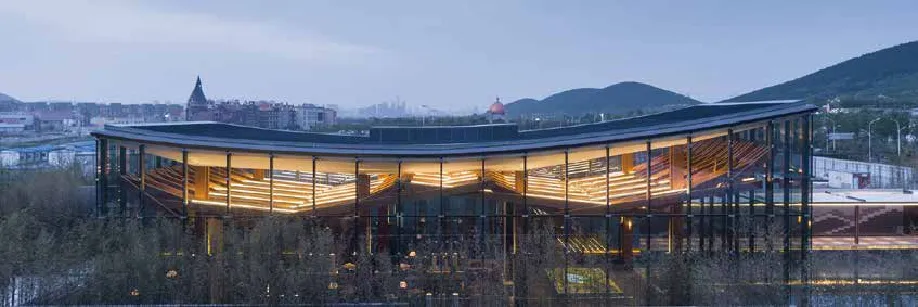
我们用不同长度的600mmx200mm长方形截面的现代集成木材(胶合木)为基本构件,将原本廊桥体系中上下木构件之间的横向支点构件(大牛头/小牛头),用前后木构件重叠处横向贯穿木构件的小截面钢管代替。通过这个方式,突破了传统廊桥结构体系受压的单向起拱特性,使得正反连续三角体系得以成立,也获得与传统廊桥结构坡度相比较为平缓的起伏,以适应建筑形体舒缓的屋面线性,木构架整体单向涌动的动势也更为直接与流畅。
最终,当四面通透的玻璃幕墙将木构架作为这个殿堂的永久展品展示出来的时刻,一种隐匿的过去仿佛如幽灵般被呼唤召回。
结构真实与场所再现
在这个项目方案过程中,结构的真实性与场所再现的问题在工作室内部其实经过了反复的讨论。
木构架自身的刚度和屋面承载力经过计算是足够的,但是为了将木构架推向空中,四面临空,独立的单跨柱子难以形成有效的框架对抗侧向力。加上在初始方案中,幕墙中的上下两块玻璃是「上部受拉,下部受压」的玻璃肋体系(但最终因为结构变形和造价控制等原因加了型钢立柱,幕墙的重量完全落地),当屋面加上上部玻璃的重量都施加在悬挑木结构的端部时,木结构的截面尺寸和节点做法都会有较大改变,对形式的影响太大。因此,木构架在本案中最终并没有作为主体结构体系的角色呈现,真实的结构是八根钢结构柱与屋面内暗藏的钢梁框架体系(有效抵抗了木构架缺失的抗侧向力的能力),木构架由柱子和顶部框架内的吊索固定在空中。廊桥木拱的受力体系在这个方案中并没有发挥原有的结构作用,这对于建筑师来说毕竟是无法忽视的遗憾。
但也正是因为这样的取舍,屋盖和木构架得以分离。在设计施工周期压缩在七个月的超短时间内,各专业才有可能实现最终的效果。在最终的呈现中,木构架和屋顶获得了某种「悬浮」的直观感受,屋面的「轻」与木构架的「重」形成了强烈的反差,一种廊桥下的场所氛围被神话般的再现。
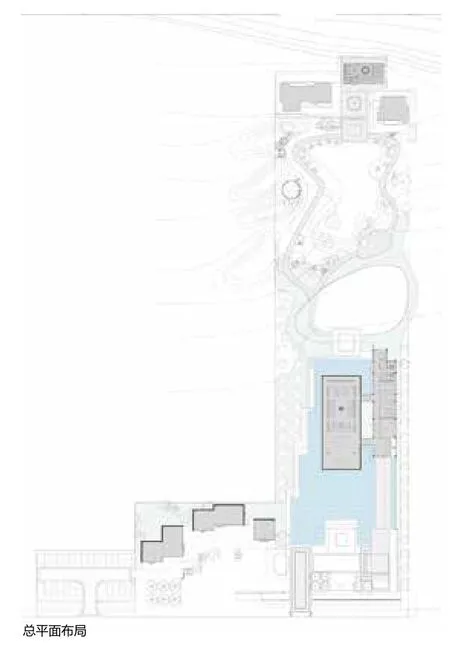
Located by the Yunlong Lake in Xuzhou, occupying over a million square metres, the launched project Vanke Future Town is a grand community with abundant landscape resources, wherein the demonstration area, as thefirst set of architectures to make an entrance to the land, will set the tone for the whole ongoing project.
The sales exhibition centre (which will later be converted into a community centre) is designed to be in proportion with and refiects the vast scale of Future Town and the geographical structure of the city.
Small spaces for the entrance hall, screening rooms, separate meeting rooms and rear services, etc., is compressed into the east wing, ensuring a single piece of large – scale space for exhibition in the main building.This layout has granted the main building an openfioor plan to achieve the multiple functions that it requires for exhibitions and as a community centre. Meanwhile, the abundant glazing of the facade gives views out to the city, reducing the architectural volume as it connects with the external space, enhancing its public characteristic.However, in contrary to its sheer appearance, inside of the main building is a set of exceedingly complex and exquisite structure.
In 2009, I visited a few ancient timber arch bridges (Beijian Bridge, Xidong Bridge, Xuezhai Bridge and the Santiao Bridge) in Taishun, Wenzhou, and its surrounding area in person. Looking up to the overlapping short timbers constructing a long-span structure, I was smitten by the beauty of its form, scale and the wisdom of the craftsmen. I since then had been revisiting them in later years.
Yet, unfortunately, in 2016, less than a month later after my last visit, Xuezhai Bridge was demolished by thefiood.Our studio has since then been studying these traditional bridges and hand modelling their long-span structure constructed of short timbers, as a tribute to the traditional Chinese craftsmanship, in order to apply its structural beauty to our projects in the future.
As in this project, the bridge structure is introduced into the large-scale exhibition space, as a piece of expressive element to be viewed from below, as a demonstration of Vanke’s technical strength and value. It is also refiected in the water patio in front of the main space.
600mmx200mm glued laminated timbers with different lengths are used as basic components. Moreover, the part works as a horizontal fulcrum between the upper and lower timbers in the original bridge structure is replaced by steel tubes, which now support the timbers by weaving in where they interlock together. With this approach,different from the unidirectional arch the original structure performs for pressure-bearing, it establishes a system of continuous triangles and inverted triangles, which slopes rather gently in comparison to the original.
When this set of wood structure isfinally put up as a permanent art piece inside of the showcase that is this exhibition space with pellucid glass curtain walls on all sides, it is felt as though the history and traditions had been lost in time is recalled to our present.
The Authenticity of the Structure and the Recreation of the Spatial Impression

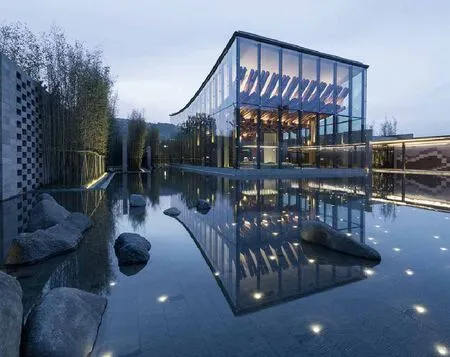

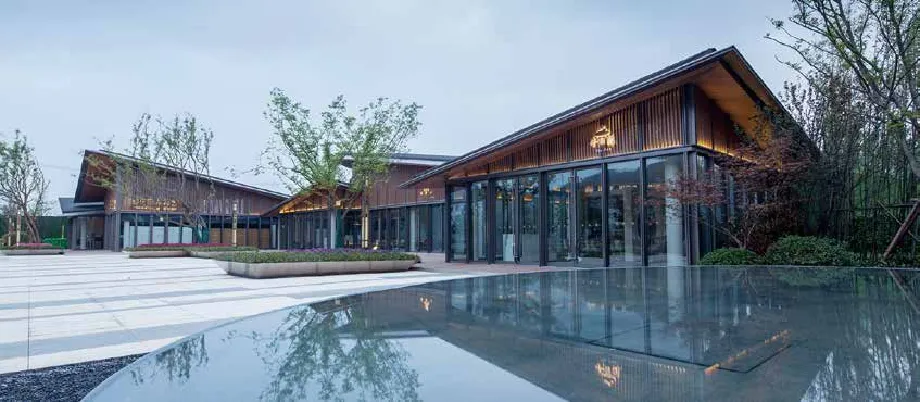

The authenticity of the structure and the recreation of the spatial impression have been discussed repeatedly in the studio as the project progresses.As we attempted to apply the structure as a ceiling that acts as a part of a force bearing structure, its stiffness and bearing capacity has gone through calculation to meet the requirements. However,the force bearing structure it forms with a group of pillars is still not able to resist lateral force when being up in mid-air. In addition,in our original proposal, the glass curtain walls with group of glass ribs was adopted, which was suspended from the timber structure ceiling (said approach was eventually replaced by the current proposal that is to support the glass curtain walls with steel studs). To achieve this vision, the requirements on the timber structure’s bearing capacity would be raised, which would lead to the significant alteration of the piece’s appearance.
Therefore, the timber piece does not act as the major structure in the force bearing system. Instead, it is supported by a group of 8 steel columns and suspended from steel beams hidden in a roof above. The latter reinforcement dismisses the lack of lateral resistance in the previous approach as the piece hits mid-air. It,although, has been a great pity, since the timber piece does not physically act as a bridge, by which it is inspired.
If it weren’t for this trade-off, however, the construction wouldn’t have been simplified, in order to be accomplished with the given time as short as 7 months. It also endows a visual sensation of floating to the space, when the suspended lumbersome looking timber piece appears to be levitating in the air, making a striking contrast with the lightsome roof above. The recreation of impression on the place from where I gazed upon the bridge underneath is effectuated.
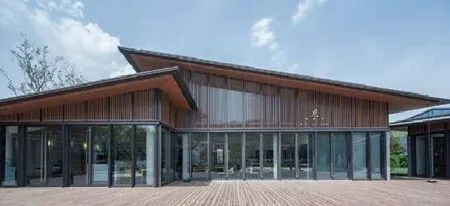



不同的结构形式对空间的限定

构件组合

受力体系的转变

